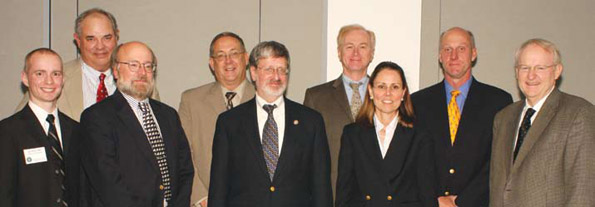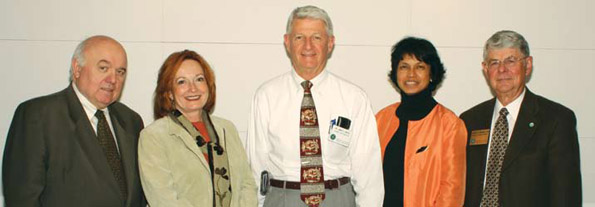Many faces, one profession
More than 400 positions exist on AVMA councils, committees, and task forces. To showcase the diverse backgrounds and expertise of the volunteers who serve on them and to inspire even more AVMA members to participate, JAVMA News will feature a few entities each month. To be a candidate for one of 78 current vacancies, click here, or contact officeevp avma [dot] org (officeevp[at]avma[dot]org).
avma [dot] org (officeevp[at]avma[dot]org).

Council on Research
Charge/mission: The council recommends activities and strategic alliances to encourage research that advances animal and human health, emphasizes the continuing need for basic and clinical research to advance the profession, and provides recommendations on research policies and priorities.
Members:
Dr. Steven Budsberg (WSU '73), chair, University of Georgia College of Veterinary Medicine, Department of Small Animal Medicine, Athens, Ga., representing veterinary medical research
Dr. John Baker (OSU '80), vice chair, Michigan State University College of Veterinary Medicine, Michigan Agricultural Extension Station, East Lansing, representing colleges of veterinary medicine
Dr. Garry Adams (TEX '64), Texas A&M University College of Veterinary Medicine, College Station, representing, veterinary medical research
Dr. Ann Hohenhaus (COR '85), The Animal Medical Center, New York, representing veterinary medical research
Dr. Kevin Lewis (IL '06), Baxter Healthcare, Deerfield, Ill., representing veterinary medical research
Dr. Kent Lloyd (CAL '83), University of California-Davis Center for Comparative Medicine, representing veterinary medical research
Dr. Don Reynolds (OSU '81), University of Prince Edward Island Atlantic Veterinary College, Charlottetown, representing veterinary medical research
Dr. Jeffrey Klausner (GA '72), The Animal Medical Center, New York, representing colleges of veterinary medicine
Dr. David McCarroll (TEX '73), Interstate Equine, Goldsby, Okla., representing private clinical practice
Dr. Michael Newman (AUB '80), Veterinary Regional Referral Hospital, Decatur, Ala., representing private clinical practice
What current project(s) are you most excited about?
The Council on Research hopes to expand funding for companion animal and equine health research, said Dr. Elizabeth Sabin, assistant director of the AVMA Education and Research Division. COR developed the Institute for Companion Animal and Equine Research in 2007 and since has been working to make it a reality. COR also continues to work with the American Veterinary Medical Foundation to enhance research funding.
A recent meaningful accomplishment:
The council recommended and championed AVMA support of a 2005 National Academies study, "Critical Needs for Research in Veterinary Science," available at www.nap.edu/catalog.php?record_id=11366. Dr. Sabin said this study has helped guide COR discussions as it considers ways the AVMA can address the report's recommendations.
How is your entity addressing the profession's pressing issues?
By promoting research as a key component to advancing the profession, COR is working to address workforce needs as well as ensure continued scientific advancements to enhance the delivery of veterinary services, Dr. Sabin said.
Concerns of recent graduates?
COR has been a strong proponent of increased AVMA support of research opportunities and funding for veterinary students and recent graduates through summer research fellowships and debt-reduction programs, Dr. Sabin said.
How is the entity addressing the AVMA strategic and operational goals?
COR Chair Steven Budsberg said the council deals with research needs and concerns that weigh into the decisional processes of the AVMA Executive Board and government agencies, such as genetically modified animals and stem cell research.

Committee on International Veterinary Affairs
Charge/mission: To study global issues in areas such as the role of the AVMA in international affairs, potential disruption of food supplies, and accreditation of veterinary education and to recommend to the Executive Board courses of action in international affairs
Members:
Dr. James Nave (MO '68), chair, AVMA globalization monitoring agent, Tropicana Animal Hospital, Las Vegas
Dr. Prema Arasu (COR '94), North Carolina State University College of Veterinary Medicine, representing the Association of American Veterinary Medical Colleges
Dr. James Brace (CAL '71), University of Tennessee-Knoxville College of Veterinary Medicine, representing the Council on Education
Dr. Joan Samuels (MSU '77), Buellton Veterinary Clinic, Buellton, Calif., representing the Council on Education
Dr. Janver Krehbiel (KSU '62), Michigan State University College of Veterinary Medicine, representing the Executive Board
What current project(s) are you most excited about?
The committee is developing the agenda for Global Animal Health Summit: A Call to Action to the U.S. Veterinary Profession, a two-day session at the 2009 AVMA Annual Convention in Seattle. The goals are to raise awareness about links between animal health, economic development, and human health in a global environment; inform AVMA members of current global programs involving veterinary medicine; market future opportunities for U.S. veterinarians in global enterprises; and create networks among participants.
A recent meaningful accomplishment:
Dr. Elizabeth Sabin, assistant director of the AVMA Education and Research Division, said the creation of this committee by the Executive Board in the first half of 2007 institutionalized international activities of the AVMA, created corporate memory, and provided dedicated staff and greater continuity for AVMA's international efforts. Creation of the committee was recognition of the increased globalization in the veterinary profession.
How is your entity addressing the profession's pressing issues?
Enhancing relationships with other entities such as the U.S. Department of Agriculture, U.S. Army Veterinary Corps, and Association of American Veterinary Medical Colleges will enhance the veterinary profession's ability to address global issues including educational needs, workforce needs, food safety, and human and animal health, Dr. Sabin said.
Concerns of recent graduates?
New graduates and students are seeking international work experience, and the committee can better facilitate and coordinate such opportunities. This will broaden workforce opportunities for all veterinarians, Dr. Sabin said.
How is the entity addressing the AVMA strategic and operational goals?
Dr. Nave said the Committee's most important actions are those that help maintain or increase the value of veterinarians' degrees.
"I don't think there's anything, period, that we as leaders in the veterinary profession can do that is more important than maintaining the value of the diploma," Dr. Nave said.
The Committee studies international issues that can affect U.S. veterinarians, such as food safety, trade agreements, agricultural bioterrorism, and animal welfare.
Dr. Nave said it is important to work with and learn from friends in other countries, know what is happening abroad, and become involved in international affairs. With increased globalization, world events have more impact on every AVMA member.
"If we're not involved, then we're just a victim of what happens," Dr. Nave said.